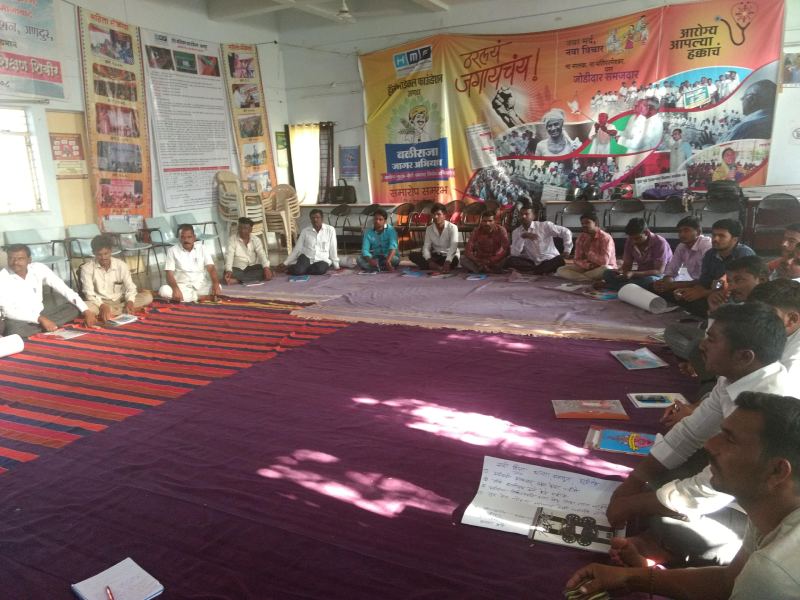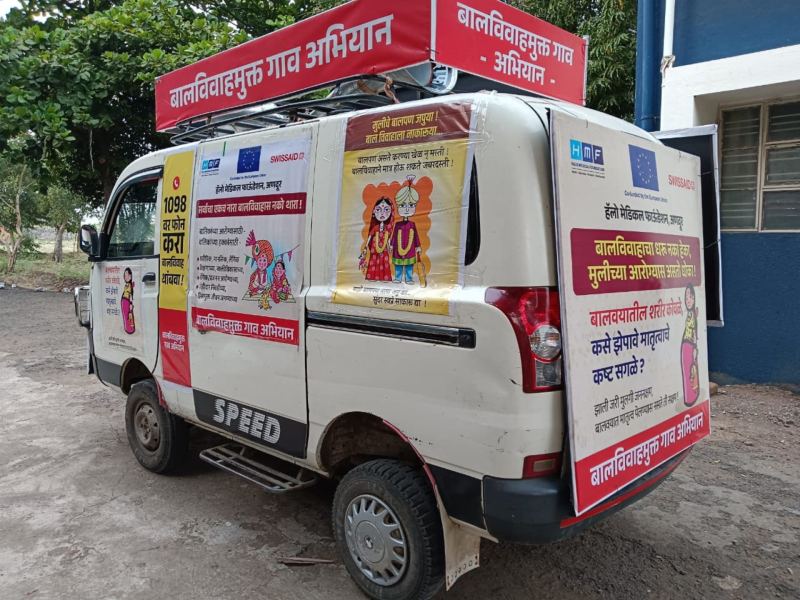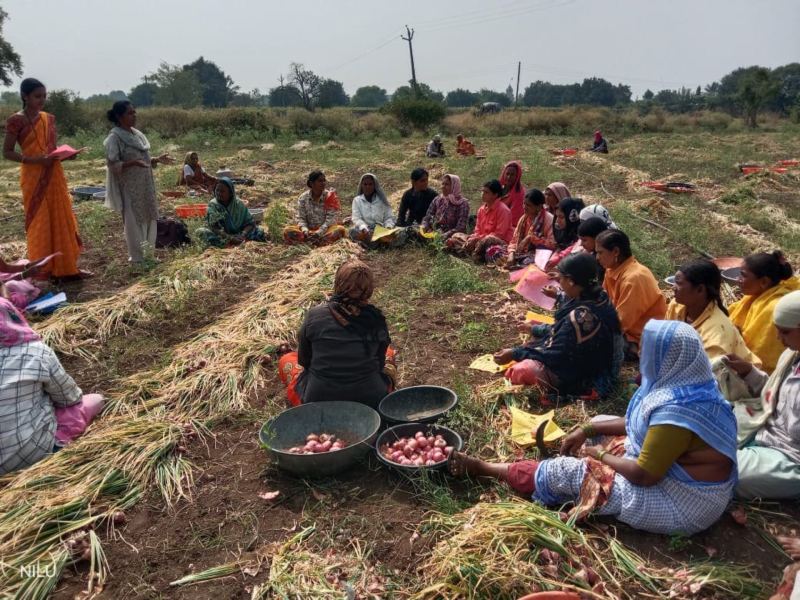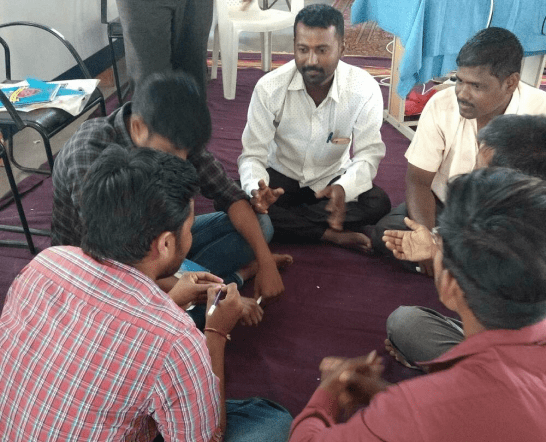Overview
Drawing insights from the successful implementation of the Samajdaar Jodidaar (Responsible Partnership) project in the Akkalkot Block of the Solapur District, HMF extended similar interventions in its 40 project areas in the Tuljapur and Lohara Blocks of the Dharashiv District. In a bid to scale up its impact, HMF expanded its reach in 2019 by adopting an additional 30 villages within these two blocks. This expansion led to the launch of the ‘Social Norms Project,’ aimed at cultivating a dedicated group of male change agents within village communities.
The approach:
The approach to mobilising men for gender justice was two pronged:
Personal Transformation:
Facilitating processes that impact men’s relationships and family dynamics. This involved challenging and deconstructing harmful masculine identities imposed by patriarchy.
Community and institutional Change:
Engaging men as change agents to foster gender equality in the community, its institutions and state-run services.
The strategy
Social norms rooted in long-standing traditions and patriarchal systems, create rigid notions of masculinity and femininity, guide behaviour and perpetuate gender inequality. These norms vest power in men, resulting in controlling women, discrimination and violence against women. When intersecting with other biases like caste and religion, the impact on women worsens. Addressing this requires change in mindsets through a step-by-step strategy:
CREATE AWARENESS → CHALLENGE NORMS → PROMOTE CHANGE → PUBLICIZE NEW NORMS
The common social/ gender norms include beliefs such as:
– Women should not work outside the home.
– Women should not talk to men outside the home.
– Marriages should be within the caste (endogamous).
– Girls should be married early to prevent sexual “mishaps.”
– It is correct to beat a woman or wife if she is disobedient or makes mistakes.
– Dowry should be given or accepted.
– Birth of male child is a must, so sex-selective abortions are justified.
– A Boy is an asset, a girl is a liability.
– Men should not do domestic chores. They MUST be bread winners.
– Men should not cry, they should be physically and emotionally strong.
– Women should do the laborious farm work, while men should do ploughing, sowing, watering the field, taking care of animals, taking decisions and sell the produce.
– These norms reflect deeply ingrained societal attitudes towards gender roles and responsibilities.
The implementation site:
30 villages in the Tuljapur and Lohara blocks of the Dharashiv (previously Osmanabad) District. Total population covered was 109,248 (56,463 male and 52,785 female population).
As a strategy, ‘Towards Gender Equality’ project was aptly named ‘Nirdhar Samanatecha Project’ (meaning ‘Commitment to Equality’) to ensure that its mission remained forefront in the minds of its implementors. Similarly, in line with this vision, the community male animators were designated as ‘Prerak’ (meaning ‘Inspirers’), emphasizing their role as catalysts for positive change within their communities.
Activities
- Establish a cadre of Animators – the primary change agents
- Selection: Selected young men aged 18-35 years, one from each of the 30 selected villages.
- Capacity building
- Three 3-day residential workshops that focussed on gender and violence, patriarchy, masculinity, sexuality, and law, all of which address the discriminatory gender norms.
- Two exposure visits to organizations associated with similar issues.
- Practice of gender-equal behaviours encouraged through experience-sharing sessions and mentoring by gender specialist.
- Mentorship provided for hands-on skill training in mobilizing young men and facilitating discussions on gender issues.
- Training and reference material provided for further knowledge development, including written material, links to film clips, and audio-visual material.
- Train community youth: Two-day residential centralised workshops for about 60 selected youth from 30 villages (2 from each village).
- Conduct campaigns: 14-day campaign during the fortnight 25th November to 10th December against violence against women and child marriage by animators and youth groups.
- Undertake awareness activities: through corner meetings, street plays, wall paintings, poster exhibitions, marches, public pledges, and signature campaigns.
- Involve village governance bodies (gram panchayats) and other Committees in awareness programs and campaigns.

Capacity building workshop

25th November to 10th December against violence against women and child marriage by animators and youth groups

Undertake awareness activities: through corner meetings, street plays, wall paintings, poster exhibitions, marches, public pledges, and signature campaigns.
Testimony
Male animator:
“When I put restrictions on my wife about where she could go/ not go, whom she could talk/ not talk, little had I known that I was inflicting violence on her. This behaviour is also violence. Realizing this, I now encourage her to join the local micro credit group, attend mahila mandal and other such village meetings and even the gramsabha.”
As a strategy, ‘Towards Gender Equality’ project was aptly named ‘Nirdhar Samanatecha Project’ (meaning ‘Commitment to Equality’) to ensure that its mission remained forefront in the minds of its implementors. Similarly, in line with this vision, the community male animators were designated as ‘Prerak’ (meaning ‘Inspirers’), emphasizing their role as catalysts for positive change within their communities.
Outcomes:
Achievements:
- Value Changes Among Male Animators:
- Increased respect for others.
- Recognition of everyone’s right to their own opinion.
- Higher tolerance levels to manage anger that trigger violent acts, including verbal violence.
- Workable project model: has indicated potential for broader application
Challenges:
- Need for More Intensive Strategies::
- Greater innovation required.
- Enhanced capacity and skill building needed for key change agents to effectively influence themselves and their communities.
- Strategies to attract youth to collaborate with the project necessary – such as leadership-building or personality development or other such ‘certified’ courses.
- Increased visibility and community engagement: Need for more vigorous activities in villages to increase project visibility, such as organizing campaigns, competitions, gender funfairs, and connecting with families of youth through home visits.
Financial partner:
SWISSAID under its project titled “Campaign for transforming socio-cultural norms around VAW in Maharashtra”

Close